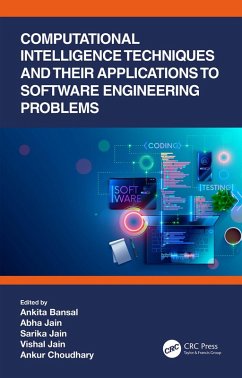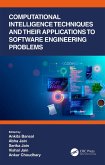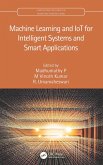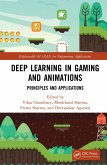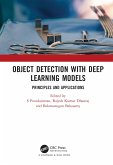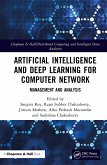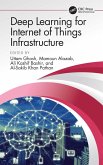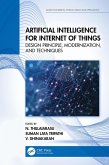Computational Intelligence Techniques and Their Applications to Software Engineering Problems (eBook, PDF)
Redaktion: Bansal, Ankita; Choudhary, Ankur; Jain, Vishal; Jain, Sarika; Jain, Abha
47,95 €
47,95 €
inkl. MwSt.
Sofort per Download lieferbar

24 °P sammeln
47,95 €
Als Download kaufen

47,95 €
inkl. MwSt.
Sofort per Download lieferbar

24 °P sammeln
Jetzt verschenken
Alle Infos zum eBook verschenken
47,95 €
inkl. MwSt.
Sofort per Download lieferbar
Alle Infos zum eBook verschenken

24 °P sammeln
Computational Intelligence Techniques and Their Applications to Software Engineering Problems (eBook, PDF)
Redaktion: Bansal, Ankita; Choudhary, Ankur; Jain, Vishal; Jain, Sarika; Jain, Abha
- Format: PDF
- Merkliste
- Auf die Merkliste
- Bewerten Bewerten
- Teilen
- Produkt teilen
- Produkterinnerung
- Produkterinnerung

Bitte loggen Sie sich zunächst in Ihr Kundenkonto ein oder registrieren Sie sich bei
bücher.de, um das eBook-Abo tolino select nutzen zu können.
Hier können Sie sich einloggen
Hier können Sie sich einloggen
Sie sind bereits eingeloggt. Klicken Sie auf 2. tolino select Abo, um fortzufahren.

Bitte loggen Sie sich zunächst in Ihr Kundenkonto ein oder registrieren Sie sich bei bücher.de, um das eBook-Abo tolino select nutzen zu können.
This book focusses on computational intelligence approaches as applicable in varied areas of software engineering such as software requirement prioritization, cost estimation, reliability assessment, defect prediction, maintainability and quality prediction, size estimation, vulnerability prediction, test case selection, and so forth.
- Geräte: PC
- ohne Kopierschutz
- eBook Hilfe
- Größe: 7.69MB
Andere Kunden interessierten sich auch für
![Computational Intelligence Techniques and Their Applications to Software Engineering Problems (eBook, ePUB) Computational Intelligence Techniques and Their Applications to Software Engineering Problems (eBook, ePUB)]() Computational Intelligence Techniques and Their Applications to Software Engineering Problems (eBook, ePUB)47,95 €
Computational Intelligence Techniques and Their Applications to Software Engineering Problems (eBook, ePUB)47,95 €![Machine Learning and IoT for Intelligent Systems and Smart Applications (eBook, PDF) Machine Learning and IoT for Intelligent Systems and Smart Applications (eBook, PDF)]() Machine Learning and IoT for Intelligent Systems and Smart Applications (eBook, PDF)47,95 €
Machine Learning and IoT for Intelligent Systems and Smart Applications (eBook, PDF)47,95 €![Deep Learning in Gaming and Animations (eBook, PDF) Deep Learning in Gaming and Animations (eBook, PDF)]() Deep Learning in Gaming and Animations (eBook, PDF)48,95 €
Deep Learning in Gaming and Animations (eBook, PDF)48,95 €![Object Detection with Deep Learning Models (eBook, PDF) Object Detection with Deep Learning Models (eBook, PDF)]() Object Detection with Deep Learning Models (eBook, PDF)46,95 €
Object Detection with Deep Learning Models (eBook, PDF)46,95 €![Artificial Intelligence and Deep Learning for Computer Network (eBook, PDF) Artificial Intelligence and Deep Learning for Computer Network (eBook, PDF)]() Artificial Intelligence and Deep Learning for Computer Network (eBook, PDF)46,95 €
Artificial Intelligence and Deep Learning for Computer Network (eBook, PDF)46,95 €![Deep Learning for Internet of Things Infrastructure (eBook, PDF) Deep Learning for Internet of Things Infrastructure (eBook, PDF)]() Deep Learning for Internet of Things Infrastructure (eBook, PDF)46,95 €
Deep Learning for Internet of Things Infrastructure (eBook, PDF)46,95 €![Artificial Intelligence for Internet of Things (eBook, PDF) Artificial Intelligence for Internet of Things (eBook, PDF)]() Artificial Intelligence for Internet of Things (eBook, PDF)50,95 €
Artificial Intelligence for Internet of Things (eBook, PDF)50,95 €-
-
-
This book focusses on computational intelligence approaches as applicable in varied areas of software engineering such as software requirement prioritization, cost estimation, reliability assessment, defect prediction, maintainability and quality prediction, size estimation, vulnerability prediction, test case selection, and so forth.
Dieser Download kann aus rechtlichen Gründen nur mit Rechnungsadresse in A, B, BG, CY, CZ, D, DK, EW, E, FIN, F, GR, HR, H, IRL, I, LT, L, LR, M, NL, PL, P, R, S, SLO, SK ausgeliefert werden.
Produktdetails
- Produktdetails
- Verlag: Taylor & Francis
- Seitenzahl: 265
- Erscheinungstermin: 27. September 2020
- Englisch
- ISBN-13: 9781000191929
- Artikelnr.: 59951502
- Verlag: Taylor & Francis
- Seitenzahl: 265
- Erscheinungstermin: 27. September 2020
- Englisch
- ISBN-13: 9781000191929
- Artikelnr.: 59951502
- Herstellerkennzeichnung Die Herstellerinformationen sind derzeit nicht verfügbar.
Ankita Bansal is an assistant professor at Netaji Subhas University of Technology (NSUT), Delhi, India. Prior to joining NSUT, Dr. Bansal worked as a full-time research scholar at Delhi Technological University (formerly Delhi College of Engineering). She received her master's and doctoral degrees in computer science from Delhi Technological University (DTU). Her research interests include: software quality, soft computing, database management, machine learning, and meta heuristic models. Abha Jain is an assistant professor at Shaheed Rajguru College of Applied Sciences for Women, Delhi University, India. Prior to joining the college, she worked as a full-time research scholar and received a doctoral research fellowship from Delhi Technological University. She received her master's and doctorate degrees in software engineering from DTU. Her research interests include: data mining, software quality, and statistical and machine learning models. She has published papers in international journals and conferences. Sarika Jain graduated from Jawaharlal Nehru University (India) in 2001. She has served in the field of education for over 19 years and is currently in service at the National Institute of Technology Kurukshetra, India. Dr. Jain has authored/co-authored over 100 publications including books. Her current research interests include: knowledge management and analytics, semantic web, ontological engineering, and intelligent systems. Dr. Jain has supervised two doctorate scholars (five ongoing) who are now pursuing their postdoctorates. She has two research-funded projects: one is ongoing, funded by CRIS TEQUIP-III, and the other is completed, funded by DRDO India. She has also applied for a patent. Dr. Jain has been supervising DAAD interns from different German universities and works in collaboration with various researchers across the globe including: Germany, Austria, Australia, Malaysia, the US, Romania, and many others. She is a member of IEEE and ACM and a Life Member of CSI, IAENG, and IACSIT. Vishal Jain is an associate professor with Bharati Vidyapeeth's Institute of Computer Applications and Management (BVICAM), New Delhi, India (affiliated with Guru Gobind Singh Indraprastha University, and accredited by the All India Council for Technical Education). He first joined BVICAM as an assistant professor. Before that, he worked for several years at the Guru Premsukh Memorial College of Engineering, Delhi, India. He has more than 350 research citation indices with Google Scholar (h-index score 9 and i-10 index 9), and has authored more than 70 research papers in reputed conferences and journals including Web of Science and Scopus. Dr. Jain has authored and edited more than 10 books with various reputed publishers including Springer, Apple Academic Press, Scrivener, Emerald, and IGI-Global. His research areas include: information retrieval, semantic web, ontology engineering, data mining, adhoc networks, and sensor networks. He was a recipient of the: Young Active Member Award for 2012-13 from the Computer Society of India, Best Faculty Award for 2017, and Best Researcher Award for 2019 from BVICAM, New Delhi. Ankur Choudhary majored in computer science and engineering and pursued a PhD from the School of ICT, Gautam Buddha University (GBU), Greater Noida, India. He has approximately 15+ years of teaching experience and is currently a professor at Sharda Univeristy, Greater Noida, India. His areas of research include: nature-inspired optimization, artificial intelligence, software engineering, medical image processing, and digital watermarking. Dr. Choudhary has published research papers in various SCI/Scopus indexed international conferences and journals, and is associated with various international journals as a reviewer and editorial board member. He has organized conferences, special sessions at international conferences, served and delivered as session chair.
1. Implementation of Artificial Intelligence Techniques for Improving
Software Engineering. 2. Software effort estimation: Machine learning vs.
Hybrid algorithms. 3. Implementation of Data Mining Techniques for Software
Development Effort Estimation. 4. Empirical Software Measurements with
Machine Learning. 5. Project Estimation And Scheduling Using Computational
Intelligence. 6. Application of Intuitionistic Fuzzy Similarity Measures in
Strategic Decision-Making. 7. Nature-Inspired Approaches to Test Suite
Minimization for Regression Testing. 8. Identification and Construction of
Reusable Components from Object-Oriented Legacy Systems using various
Software Artifacts. 9. A Software Component Evaluation and Selection
Approach Using Fuzzy Logic. 10. Smart Predictive Analysis for Testing
Messaging-passing Applications. 11. Status of Agile Practices in the
Software Industry in 2019. 12. Agile Methodologies: A Performance Analysis
To Enhance Software Quality. 13. Pre-Trained Deep Neural Networks for Age
Prediction from IRIS Biometrics. 14. Hybrid Intelligent Decision Support
Systems to Select The Optimum Fuel Blend in CI Engine. 15. Understanding
the Significant Challenges of Software Engineering in Cloud Environment.
Software Engineering. 2. Software effort estimation: Machine learning vs.
Hybrid algorithms. 3. Implementation of Data Mining Techniques for Software
Development Effort Estimation. 4. Empirical Software Measurements with
Machine Learning. 5. Project Estimation And Scheduling Using Computational
Intelligence. 6. Application of Intuitionistic Fuzzy Similarity Measures in
Strategic Decision-Making. 7. Nature-Inspired Approaches to Test Suite
Minimization for Regression Testing. 8. Identification and Construction of
Reusable Components from Object-Oriented Legacy Systems using various
Software Artifacts. 9. A Software Component Evaluation and Selection
Approach Using Fuzzy Logic. 10. Smart Predictive Analysis for Testing
Messaging-passing Applications. 11. Status of Agile Practices in the
Software Industry in 2019. 12. Agile Methodologies: A Performance Analysis
To Enhance Software Quality. 13. Pre-Trained Deep Neural Networks for Age
Prediction from IRIS Biometrics. 14. Hybrid Intelligent Decision Support
Systems to Select The Optimum Fuel Blend in CI Engine. 15. Understanding
the Significant Challenges of Software Engineering in Cloud Environment.
1. Implementation of Artificial Intelligence Techniques for Improving
Software Engineering. 2. Software effort estimation: Machine learning vs.
Hybrid algorithms. 3. Implementation of Data Mining Techniques for Software
Development Effort Estimation. 4. Empirical Software Measurements with
Machine Learning. 5. Project Estimation And Scheduling Using Computational
Intelligence. 6. Application of Intuitionistic Fuzzy Similarity Measures in
Strategic Decision-Making. 7. Nature-Inspired Approaches to Test Suite
Minimization for Regression Testing. 8. Identification and Construction of
Reusable Components from Object-Oriented Legacy Systems using various
Software Artifacts. 9. A Software Component Evaluation and Selection
Approach Using Fuzzy Logic. 10. Smart Predictive Analysis for Testing
Messaging-passing Applications. 11. Status of Agile Practices in the
Software Industry in 2019. 12. Agile Methodologies: A Performance Analysis
To Enhance Software Quality. 13. Pre-Trained Deep Neural Networks for Age
Prediction from IRIS Biometrics. 14. Hybrid Intelligent Decision Support
Systems to Select The Optimum Fuel Blend in CI Engine. 15. Understanding
the Significant Challenges of Software Engineering in Cloud Environment.
Software Engineering. 2. Software effort estimation: Machine learning vs.
Hybrid algorithms. 3. Implementation of Data Mining Techniques for Software
Development Effort Estimation. 4. Empirical Software Measurements with
Machine Learning. 5. Project Estimation And Scheduling Using Computational
Intelligence. 6. Application of Intuitionistic Fuzzy Similarity Measures in
Strategic Decision-Making. 7. Nature-Inspired Approaches to Test Suite
Minimization for Regression Testing. 8. Identification and Construction of
Reusable Components from Object-Oriented Legacy Systems using various
Software Artifacts. 9. A Software Component Evaluation and Selection
Approach Using Fuzzy Logic. 10. Smart Predictive Analysis for Testing
Messaging-passing Applications. 11. Status of Agile Practices in the
Software Industry in 2019. 12. Agile Methodologies: A Performance Analysis
To Enhance Software Quality. 13. Pre-Trained Deep Neural Networks for Age
Prediction from IRIS Biometrics. 14. Hybrid Intelligent Decision Support
Systems to Select The Optimum Fuel Blend in CI Engine. 15. Understanding
the Significant Challenges of Software Engineering in Cloud Environment.
